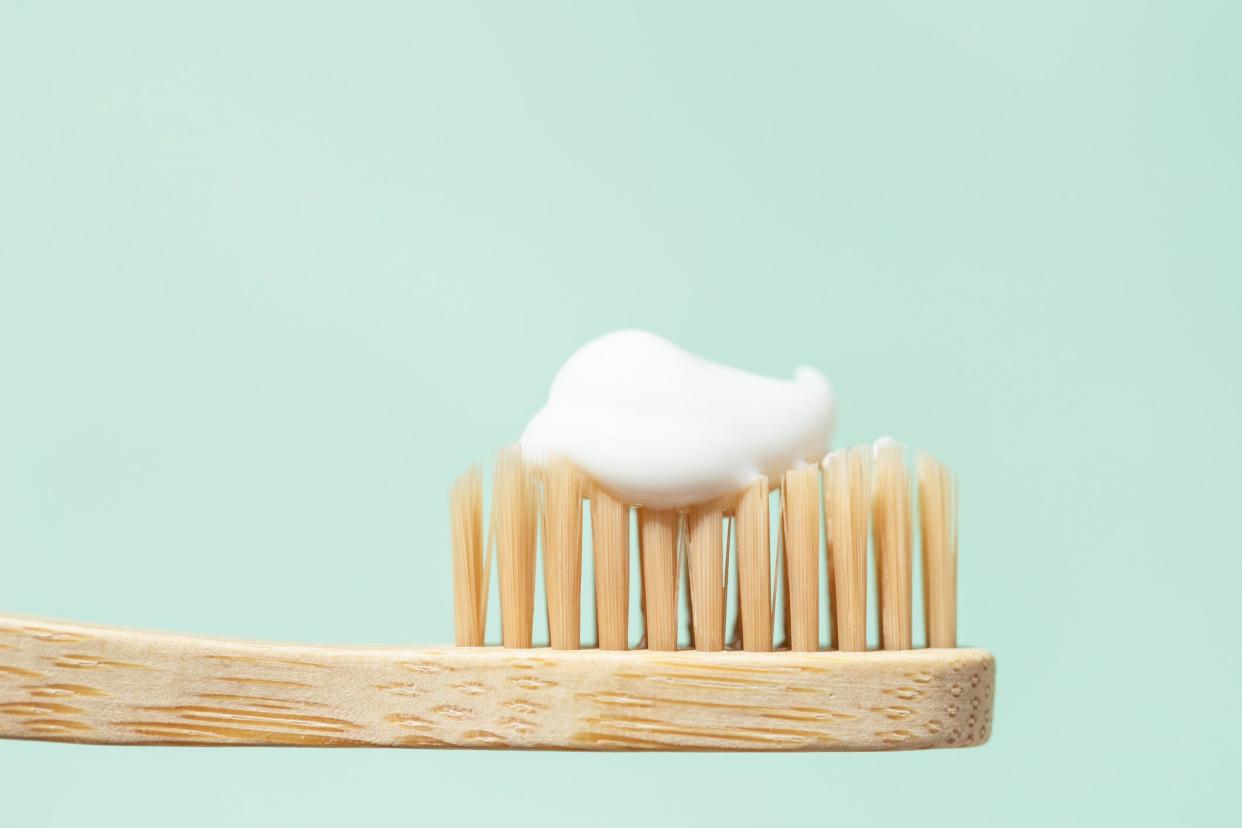How Toothpaste Could Help People Overcome Peanut Allergies

Zolga_F/Getty
Fact checked by Nick Blackmer
Key Takeaways
A small study has shown that a specially formulated toothpaste can help desensitize people with food allergies through a treatment called oral mucosal immunotherapy (OMIT).
If more testing shows it’s safe and effective for kids as well as adults, it could be an easier way to help people overcome food allergies.
The current standard of care for food allergies is avoiding triggers and carrying an auto-injector epinephrine pen to be prepared for life-threatening anaphylaxis.
Brushing with a special toothpaste could be the future of oral immunotherapy for people with severe food allergies, according to new research that was presented at the American College of Allergy, Asthma, and Immunology (ACAAI) Annual Scientific Meeting in early November.
The small study followed 32 adults with a peanut allergy. For 48 weeks, the participants used a special toothpaste that contained a targeted dose of peanut protein. The goal was to desensitize the body by introducing small doses of the allergen directly into the mouth—a treatment called oral mucosal immunotherapy (OMIT).
While the study’s findings are preliminary, the researchers say that the special toothpaste could be a relatively easy, effective, and safe way to give people with peanut allergies OMIT.
“This strategy is innovative,” Sayatani Sindher, MD, clinical associate professor of pediatric allergy and clinical immunology at Stanford Health Care, told Verywell. “Pairing a daily habit (teeth brushing) with something that can help with food allergies is quite ingenious.”
Related: The 9 Most Common Food Allergens
What Is Oral Mucosal Immunotherapy?
Oral immunotherapy (OIT, which includes OMIT) is an emerging treatment for food allergies, particularly peanut allergies. The idea behind it is to desensitize the body and decrease the severity of an allergic reaction to an allergen (for example, reducing the risk of life-threatening anaphylaxis). It’s not a cure for food allergies, but oral immunotherapy has been shown to desensitize 60 to 80% of people studied.
While OIT is considered safe, it can have side effects such as:
Abdominal pain
Vomiting
Cramping
Inflammation of the esophagus
Hives
Swelling
Rash
Wheezing
Another downside of oral immunotherapy is the lengthy time commitment. People need to consistently do treatment and increase the dose as they go to effectively build up tolerance.
To combat the inconvenience, the researchers in the recent study wanted to find a way to make oral immunotherapy part of something a person is likely already doing at home every day—such as brushing their teeth.
“Using toothpaste to treat peanut allergies is an interesting concept,” Zachary Rubin, MD, spokesperson for the American College of Allergy, Asthma, and Immunology, told Verywell. “This would be a convenient way to help reduce the chances of developing a severe allergic reaction. This type of technology could potentially be used for other food allergens.”
That said, we’re still a ways off from the toothpaste being available to patients outside of studies. The Food and Drug Administration (FDA) has yet to approve any products since they’re all still in the research stage.
“Currently, there is not enough data to determine whether this will become a standard tool,” Rubin said. “So far, the safety looks promising, but we need to see data on how effective it is before coming up with conclusions.”
Related: How Are Food Allergies Treated?
Can Kids Use the Toothpaste?
The formulated toothpaste was only tested on adults between the ages of 18 and 55. However, researchers are looking for ways to make allergy therapy easier for children.
For example, a 2016 study found that OIT was an effective therapy for preschool-aged children with peanut allergies by suppressing allergic reactions. Sublingual immunotherapy (SLIT), in which an allergen is introduced under the tongue, also seems to be a potential way to do allergy desensitization in children.
While more studies are needed to determine if a formulated toothpaste would be safe and effective for children, Sindher thinks it is promising. Plus, the fluoride in toothpaste could add some dental health benefits to oral immunotherapy for kids and adults.
Related: How Does Immunotherapy for Allergies Work?
What Options Do People With Food Allergies Have?
The standard of care for people with food allergies is to avoid allergens and carry an epinephrine auto-injector pen (EpiPen) in case of an anaphylactic emergency. However, ongoing OIT studies may show that other options can be safe and effective.
Takeaway
An estimated 10.8% of the U.S. population has at least one food allergy, including 7.6% of children. The most common allergies among adults are shellfish, milk, peanuts, tree nuts, and fish. Among children, the most common allergies are peanuts, milk, shellfish, and tree nuts.
Food allergies can negatively affect mental health, cause financial hardships related to treatment, and increase the risk of developing other related chronic conditions such as eczema and asthma.
In 2020, the FDA approved Palforzia (a low dose of peanut protein) for children aged 4–17. The three-phase treatment includes a starting dose and several months of up-dosing therapy done at a clinic or provider’s office, followed by a continuous maintenance dose at home.
However, Palforzia is currently only offered at specially certified healthcare centers, and participants must be enrolled in a Risk Evaluation and Mitigation Strategy (REMS) to take part.
According to Sindher, having more ways to minimize the burden of food allergies would be a game-changer for people of all ages living with severe food allergies.
What This Means For You
Oral immunotherapy is an emerging strategy for helping people overcome food allergies, especially peanut allergies. Researchers are studying the potential of a special toothpaste that could make doing the treatment at home much easier.
Read Next: Boiled Peanuts May Be the Key to Curing Peanut Allergies
Read the original article on Verywell Health.

